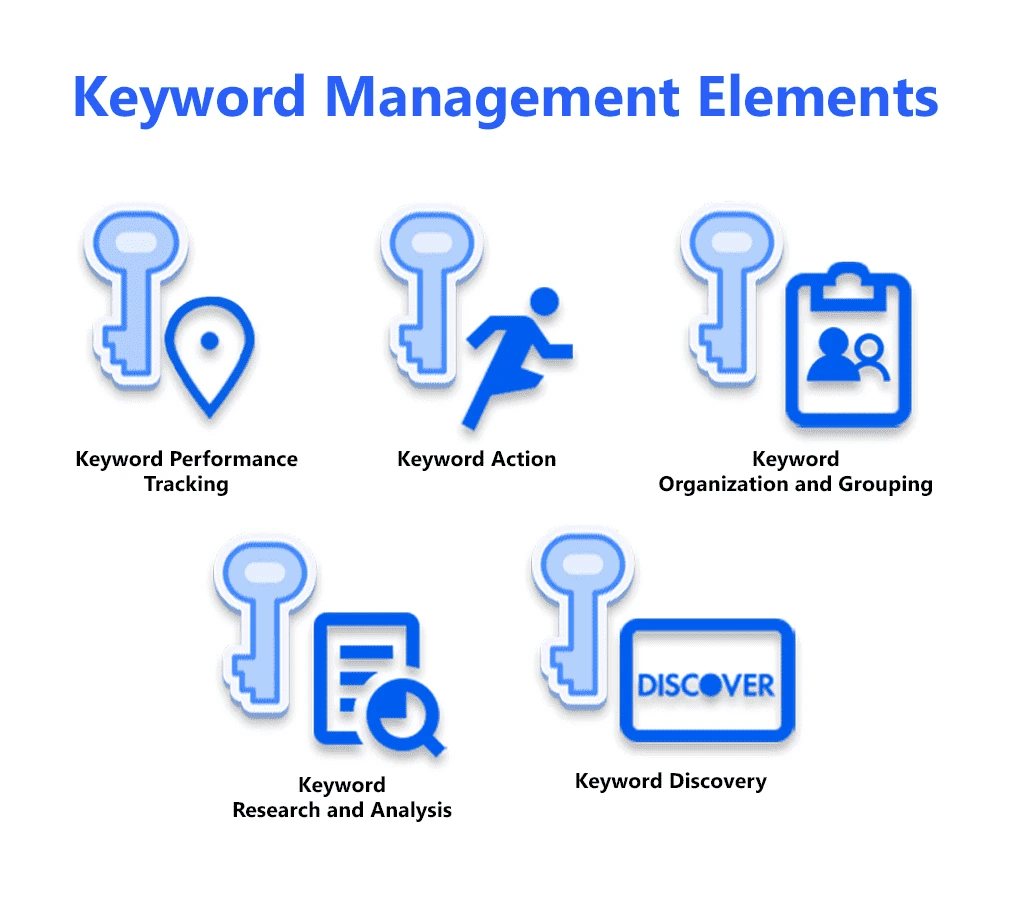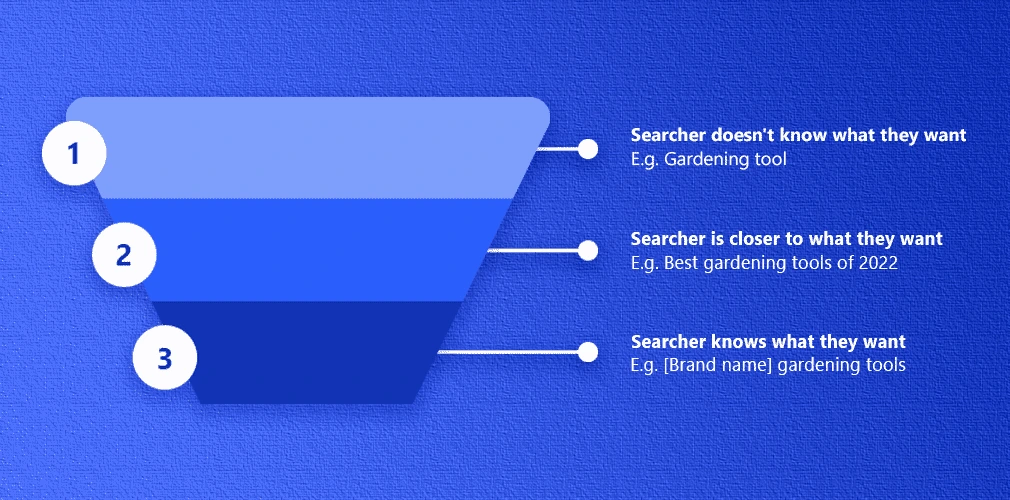Keywords are essential for SEO, and monitoring them will help you understand your opportunities. To rank high on the SERP, you have to monitor your SEO efforts' results constantly.
Tracking your keywords is essential to your success, as it provides insight into your website's performance.
This data can help you improve your SEO content strategy and increase traffic to your website, and keyword management and performance tracking tools can help you achieve both.
Keyword Management: An Overview
Website audits reveal a lot about your website’s performance. The keywords used for an SEO campaign need to be constantly tracked and managed to understand what is working and not working for your website.
While building backlinks and posting content regularly, marketers forget to analyze how their previous content is performing and what changes to make next for better performance of keywords. Proper keyword management will help you get the most out of your SEO campaigns.
Besides, the key to keyword management is identifying and tracking high-value keywords. You can use keyword performance analysis tools to determine which search queries led your visitors to your site.
Effective keyword research is discovering what your target audience searches for and organizing those keywords. By managing your keywords into keyword groups, you'll be able to optimize your search engine optimization strategy.
Understanding the keyword landscape is an essential step in managing and tracking keywords. The keywords that bring high traffic and conversions provide useful data to implement in your SEO campaigns.
The Importance of Keyword Management in SEO
Keyword management is a game-changer in terms of making quick decisions. It saves your time and effort to yield better results and higher website traffic every time.
As an important stepping stone of SEO, finding the right keywords for your website enables the implementation of better SEO campaigning. It brings data-driven solutions to your doubts related to online marketing.
Employing various methods like keyword organizing, keyword discovery, keyword analysis, and keyword action enable a smooth, productive, and resource-saving process of keyword management.
Let us sum up some of the most important advantages of keyword management for SEO:
-
It brings more relevant content inspiration for marketers focusing on SEO.
-
It helps you analyze and get more traffic to your webpage.
-
It leads to better targeting.
-
It enables a higher click-through rate, leading to a good quality score and, eventually, higher organic rankings on the search engine results page.
-
The process of conversion is optimized and strategically planned.
The Elements of Keyword Management
There are several aspects of keyword management that need to be understood before diving into organically marketing your business online. They are as follows:

-
Keyword Discovery: The method of keyword discovery is a constant process of looking for PPC keywords that get searched to find your website. It helps you understand what keywords are used to find your website.
It gives you insight into what your target audience is typing in the search queries to lead to your website. Get a clear understanding of what popular search queries are related to what your website or business offers.
-
Keyword Research and Analysis: Keyword research or analysis bring a vast scope for keyword opportunities that help you recognize productive keywords; that is, the keywords that help bring some action like conversion of a target audience to your customers. There are some lessons available on WriterZen, showing some tips on how to do keyword research in SEO effectively.
-
Keyword Organization and Grouping: Divide and organize the keywords into small groups based on their relevance. You can group and rank the keywords based on the value of each keyword cluster to see which one drives your campaign. It helps you understand the number of keywords you need for an SEO campaign.
-
Keyword Action: The actions you take will depend on the previous steps. You can group or update keyword lists based on observations and results of the previous steps for a better keyword management system.
-
Keyword Performance Tracking: Keyword performance tracking involves a process of using tools to monitor and analyze the performance of a set of keywords regularly.
It ensures that you learn where you stand among the hierarchy of competitors and if you are earning profits. Keyword rankings are a great way to judge performance and conversions taking place.
Essential Features and Process of a Good Keyword Management Strategy
Keyword Discovery: Identifying High-Value Keywords
Identifying high-value keywords is an essential part of SEO strategy. Not all high-value keywords are generic terms that cost a fortune.
Instead, look for highly targeted keywords with a high search volume and show that the person searching for them is interested in what you have to offer.
Niche keywords are often low-volume, but they can bring you plenty of targeted traffic that is more likely to convert to a sale. Small businesses should also consider looking for niche keywords with lower search volumes.
Thus, keyword discovery allows you to access and study the keywords that your website is already ranking.
Researching and Analyzing Keywords
If you're starting in the world of SEO, researching keywords and their importance is essential to the success of your business.
Before, you might get the temptation to stuff your content with keywords to increase its ranking, but Google penalizes this practice. While keyword density is still critical, the quality of content is king.
By using specific key phrases, you'll be able to draw in customers who are looking for a particular product or service.
Organizing Keywords
For a strong SEO content marketing strategy, organizing keywords is vital. It would help categorize them by category, target persona, and campaign. Tags provide additional organization and can be used to group keywords within a variety.
This way, they know which keywords to focus on in a given content. In addition, you can use notes to include additional information, such as who is responsible for the campaign and what channels to target.
Segmenting and Distributing Your Keywords Strategically
Before executing your campaign, know which keywords you should target. Targeting a younger audience or a more competitive landscape will require different strategies.
To do this, you must understand the competitiveness of different keywords. You can further refine your campaign by defining ad groups. Here are some tips:
Targeting an Audience Based on Your Goals
The first step in content creation is to determine the demographic of your target audience.
It may include millennials, Gen Z, and other broader categories. However, these groups can be too general to be effective.
For example, if you want to market to women who are mothers, it may be best to target young women. They are more likely to be engaged with this content than the average person.
The internet provides many marketing opportunities. The use of persuasive and viral marketing strategies is increasingly common in marketing. Almost everyone now has a personal computer or a smartphone.
The youth demographic is increasingly dependent on technology and is increasingly involved in social media. Using persuasive techniques to reach this audience can be particularly effective.
In addition to using persuasive techniques, marketing campaigns can spread through the internet and word of mouth.
Targeting A More Competitive Landscape
Conducting a competitive analysis of your target industry will give you insights into the competitors' strengths and weaknesses. Start by gathering data about competitors' locations, website URLs, and other information.
Next, you will analyze their strategies to determine the potential resources that your company can use to dominate the market. Market-based view (MBV) strategic framework helps explore the competitive landscape.
Porter's five forces model enables you to identify the factors that determine the competitive landscape.
Understanding The Competitiveness Of Different Keywords
There are many different ways to learn about the competitiveness of a particular keyword. Keyword analysis tools help you do this.
To use a keyword analysis tool, you need to enter a competitor's domain or a specific page to see how competitive that keyword is. You can also check the search volume and the cost per click for that keyword.
Keywords get ranked based on the competition level by checking out highly-ranking pages. SEO experts get trained to examine the websites with high rankings and determine whether they are using strategies that can help your website rank higher.
Learning from the competition's methods can improve their keyword research and rank higher. In the long run, this will increase ROI.
Regardless of your business size, keyword competitiveness analysis will help you identify the keywords that will best suit your website's needs.
Creating Clear Goals for Keyword Performance
A vague goal is impossible to measure and will not make you any progress. You must be specific and ask yourself the questions necessary to complete your plan in more detail.
You can use analytical tools to measure progress in your keyword research. Without a goal, your keyword strategy will stagnate and be unproductive.
To create a concrete plan, consider your target audience and determine the keywords to attract them.
Keyword Action
After you finalize your next step based on the previous steps, you frame a list of authorization activities that suit your SEO campaign. It helps you to create more high-performance website content that features on the SERP.
Based on the keyword data, you can frame keyword groupings like top-level keywords, specific subgroup keywords, etc.
Several aspects like spellings, derivation, synonyms, and duplicate keywords, affect your next step in choosing the right keywords.
Keyword Performance Tracking: A Brief Overview and Understanding
Keyword performance tracking is the process of keeping records about the number of people who find your website all by themselves.
It reveals any significant changes that occur in trends so that you can alter your site’s elements to fit what is in demand.
Tracking keyword performance helps you to maximize your profits and cater to the audience with high-quality content.
It also helps enhance your overall website performance and educates you to make better decisions while framing SEO campaigns.
You can identify the areas that need improvement by monitoring and position tracking your website based on the target keywords.
It helps you identify the reasons for a drop in performance and unveils the high-performance keywords that are working for your website.
In reality, the dynamics of keyword performance keep changing with the varying demands of the audience. You may use tracker tools to analyze the performance of your target keywords.
Keep checking the structure and tone of your website and compare it with your competitors to take action accordingly. Keyword monitoring is a continuous process.
Build new SEO campaigns to gain a more evolved list of keywords that are potent and help your website flourish.

Why Should We Track Keywords?
Understanding Your Website’s Ranking Position
It is important to know where you stand among a crowd of competitors. Your ranking reveals your KPI and indicates your flaws too. To rank high on the SERP, you have an aim with a starting point.
Tracking keywords help you understand how far you have come. Several digital tools help you assess and analyze the effectiveness of your SEO strategy.
The benefit of this step is that you can include and exclude keywords based on their performance metrics and alter your website content to be more relevant to your potential customers and the search engine crawlers.
Studying How Your Competitors Rank for the Same Keywords
Analyze the performance of your competitor websites for the same list of keywords that help them rank high on the SERP. Understand how they position their keywords throughout their website based on the target audience's search intent.
A thorough competitor analysis unveils insightful data to help you rank organically. It also gives ideas for new topics, keywords, and topic clusters that bring high traffic and conversions.
Generating High Revenue
Keyword performance tracking helps you analyze the keywords, forecast, and boost business revenue. Tracking the performance of each keyword lets you decide what to use and what to exclude from your SEO and PPC campaigns.
Understanding Where You are Lacking
The primary uncertainty of launching an SEO campaign is that it may or may not draw high traffic. Sometimes the website traffic drops, and it is a common phenomenon.
It is due to an abrupt decrease in demand for the keywords included in the website content. Several other factors can also cause this issue.
For example, a broken link, a noindex meta tag, off-track optimization, excessive loading time, etc., can cause a drop in website traffic.
Identifying Organic Click-Through Rate Issues
It is essential to put your content out in a way that appeals to the audience to make them click your search listing. Unless it is ranking in the SERP, you will not get much traffic.
Without monitoring your rankings it is difficult to achieve a good organic CTR. Thus, check and tweak your website surrounding the target keywords for a good ranking on SERP.
Acquiring Keyword Data
Track your keyword performance to learn how your keywords have faired against the competitors on the SERP. You can know how many keywords have been helping your website rank since the last month.
It reveals the increase in traffic and your sales in the various positions. You can put together all the elements and factors that helped your website rank. Check the keywords that went up the rank or moved to the next page of the SERP.
How to Track Keyword Performance
For tracking a set of keywords related to your business, there are some metrics that matter:
-
Visibility: Track the visibility of your website based on the performance of the keyword sets. It is an estimation of how your website gets placed based on target keywords that are being tracked.
-
Position: In terms of the SERP, it tracks your website ranking.
-
Volume: It refers to the monthly search volume per keyword that is an essential metric to use for judging popular and competitive keywords. It gives you the average search volume for a month that also help you identify small-volume keywords.
-
Page: Understand which pages rank for the keywords used to boost their performance.
The 3 Types of Keyword Tracking
Simple Keyword List Tracking
It is the most traditional method of analyzing keyword performance. However, this process worked better when the search engine had simple algorithms. But there are some aspects that still work.
For a business with a single product or service, a single keyword listing, one location, and a low consideration product work perfectly.
In the case of multiple locations of your business, the keywords need to target various areas to get audiences from different geo-local zones.
Category Split Keyword Tracking
It is a zone where you have a huge list of keywords to track. It gets difficult to track your website’s visibility based on the performance metrics for each keyword.
Thus, splitting the metrics based on categories can help you track keyword performance effectively.
Keyword Funnel Tracking
Industries constantly try to grab the attention of their potential customers. Several long-tail queries that are unique and have never been answered by any website can be figured out with keyword funnel tracking.
The funnel comes from the marketing rules. The top funnel includes the process of awareness. The middle funnel is for consideration, and the bottom funnel is for decision.

When you represent different web pages of your website to reach the target users, it helps you get quicker conversions. Assign each page with keywords that suit the different levels of the funnel.
For example, the top funnel should include keywords with “what,” “why,” “when,” “can,” etc. The middle funnel should have “best,” “benefits,” “top,” “review,” etc. The last level should include keywords with “brand,” “near me,” “location," etc.
Once your keywords get synced with the content, it channelizes the users into your target pages flawlessly, and they can make a purchase.
Once you know your target customer and audience, you can start researching relevant keywords. Often, businesses rely too much on branded terms, which rarely work in keyword research.
To find the right keywords, you must change how you describe your services. Keyword research can be an eye-opening experience.
When you understand your audience's needs, you can create content that caters to those searches. Here are some of the critical aspects of keyword research.
Final Thoughts
Keyword monitoring is an essential part of keyword performance tracking. You can leverage your daily processes and keep track of any changes in visibility and rankings.
You can also manually annotate your findings to backtrack the monthly reports. With this tool, you can even save the data from the month's campaign reports.
It can also help you identify keyword opportunities and edit irrelevant keywords early in the campaign.















